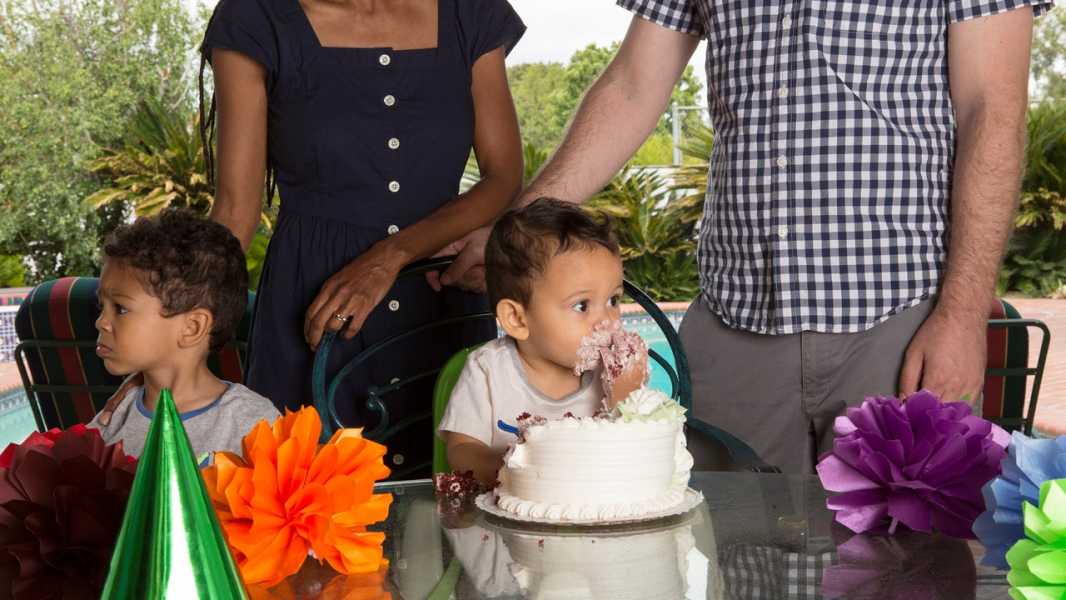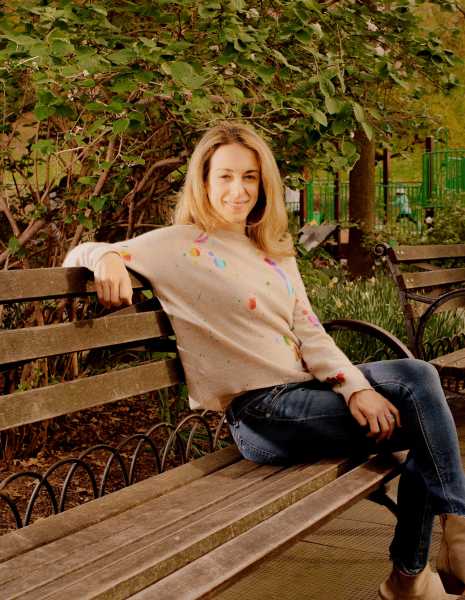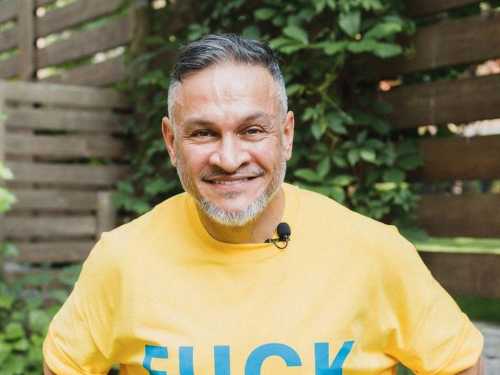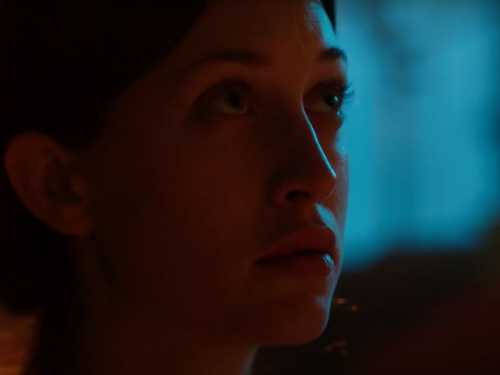
Save this storySave this storySave this storySave this story
Every morning, as parents across the country struggle to get their kids out of bed and out the door to school or sports, they may feel a reassuring voice in their ear. Perhaps it says, “Resistance is part of the pathway to separation”; perhaps it says, “If we want kids to tolerate frustration, we have to tolerate their frustration.” That voice—the calm, firm, and empathetic tones of the fully actualized contemporary parent—belongs to Becky Kennedy, a.k.a. Dr. Becky, the Manhattan-based clinical psychologist whose punchy scripts and practical advice have earned her more than two million followers on Instagram, a Times No. 1 best-seller (“Good Inside: A Guide to Becoming the Parent You Want to Be”), and a blockbuster podcast (“Good Inside with Dr. Becky”).
Like many of her peers, Kennedy rejects what is often called the behaviorist approach to parenting, in which caregivers attempt to condition children’s behavior by wielding rewards and punishments—sticker charts, time-outs, and the like. “Behaviorism privileges shaping behavior rather than understanding behavior,” Kennedy, a mother of three, writes in “Good Inside.” “It sees behavior as the whole picture rather than as an expression of underlying unmet needs.” Kennedy encourages parents to privilege making connections over meting out consequences, and she demonstrates how in snappy posts and videos such as “Try This Instead of ‘Go to your room!,’ ” “4 Ways To Say No To Your Child,” “When It Feels Like You Might Explode,” and—a personal favorite—“Ever wonder . . . Is my child a sociopath?”
A big part of Kennedy’s appeal is that she has carefully cultivated a down-to-earth, I’m-in-this-with-you persona—her videos often seem captured on the fly, filmed while she walks down a New York City sidewalk or sits in a quiet corner of her apartment with her kids in the next room. “There’s just so much shame potential in receiving parenting advice,” Kennedy told me when I spoke with her on Zoom recently. “As soon as you learn something new, and think, Oh, I never thought about it that way before—simultaneously, you might think, Oh, how did I not know that? Learning something new is brave, and learning from someone who also is a fallible human being is the only way I’ve ever learned anything. I always want to be off the pedestal.” Our conversation has been condensed and edited.

“None of us is perfect,” Dr. Becky says. “I have my reactive moments as well.”Photograph by Tonje Thilesen
You advocate for a parenting style that moves the conversation away from “good” versus “bad” behavior, and instead sees a child who is acting out as “a good kid having a hard time.” It’s a thread that runs through all of your work. How did you land on that?
It probably was a way of encapsulating the difference between how I was trained versus what I felt at my core was true and helpful. There’s a fork in the road in how we intervene with our kids: Am I looking at my kid like they’re a bad kid doing bad things, or like they’re a good kid having a hard time? All of the different parenting strategies and interventions are in one of those two buckets. Nobody ever says, “Hey, what I recommend you do comes from the belief that you have a bad kid doing bad things.” But punishments and control and time-outs, even sticker charts and using praise to shape behavior—in all of that, there’s inherently a lack of trust.
I’m drawn to the gap in kids—and, frankly, in adults—that we can be good inside and we can behave very badly on the outside. Why is this good person doing these bad things? Why is my good kid hitting their sibling? Why is my good kid lying to my face? When you can allow yourself to be curious about that gap between good identity and bad behavior—all the productive interventions flow from there.
To what extent do you test-drive your scripts with your own kids? Do you always do a soft launch at home?
Yeah, definitely. And certainly some parents have asked me about situations that I’ve never faced in that exact same way with my kids. But there’s actually a very small range of core principles that every situation can come back to. The biggest one is that your good kid is having a hard time, and that framework allows you to stay connected to your kid. You see your kid as being on the same team, like, it’s me and my kid against a problem, not me against my kid. That’s where the scripts come in handy. People can understand that a child needs help, not punishment, but taking the leap from a framework to specific words is hard.
In one of your recent videos, you had just left your daughter at home to go to dinner with friends, and she was crying because she didn’t want you to leave. It felt a little raw and vulnerable, like you were processing your own emotions in real time. I think that that kind of vulnerability is part of why so many parents engage with your work, but I wondered if it ever takes a toll on you. Do you have to put down certain boundaries between the public Dr. Becky persona, on the one hand, and your private life as a parent, on the other?
Yes, and that’s a boundary I take very seriously. I’ve never used my kids’ names; I don’t show pictures of them. It’s tricky, because I want to be very open and specific, and I want people to know that Dr. Becky is not my kids’ mom—that would be very, very weird for everyone and not a good situation. Nobody needs Dr. Becky as their real-life mom.
None of us is perfect. I have my reactive moments as well. I’m always trying to figure out what the line is between letting people know that I’m in this, too, and really fierce protection of my kids’ right to write their own online story. I never want my kids to feel like they’re pawns in my career game.
In your book, “Good Inside,” you write about how good parenting can often feel kind of bad. That’s a central dissonance of the job, like, “I think I handled that situation O.K., so why do I feel like garbage?”
A hundred per cent. Take a moment where you’re in the grocery store with your kid and he wants a candy bar. I can say, “Look at me, I’m not even on my cell phone—I’m so present as a 2023 parent.” And I say to my kid, “Hey, I know you really want that candy bar. So yummy. Here’s the thing—you’re not gonna get it. I can take a picture of it so I remember it. And I know we’ll get through this together.” If I press pause in that brief second, I’d say to myself, “Becky, I crushed that moment. I set a boundary; I embodied my authority, not in a scary way; I was clear; I validated my kids’ reality. I did all the things.” There is an unconscious belief that my child will look at me and say, “You are such a sturdy leader. That feels so good. I can deal with this. So I will walk with you calmly to the checkout register.”
And that is just not what happens. It’s just not what happens! My child might still have a meltdown. But what I am hearing from parents is that they are now finding wins in the moments that used to send them spiralling, like, “Oh, my goodness, my kid had a tantrum, everyone thought I was such a bad parent, and I saw this other parent I know from school, and why are all the other kids in the grocery store so calm, and is my kid gonna end up in jail?” The shift happens when you move your gaze from your kids’ reaction to the way you show up for your kid. It remains hard. But there is a new perspective of, Wow, you know, sturdy pilots don’t always avoid turbulence on a flight, but they make their way through, and when they land safely they actually build confidence because of how they managed that turbulent flight.
It is tough, because just as we don’t want to do sticker charts to reward good behavior in our kids, the parent isn’t necessarily being rewarded for good parenting. That’s the model that we’re used to—you put in the work and you get something back.
There’s a long lag time for some things. We’re talking about helping our kids build emotion-regulation skills, which is the most important thing in childhood. Emotion-regulation skills relate to academics, they relate to confidence, they relate to managing anger, they relate to communicating effectively, they relate to not being entitled. All of the things we want for our kids come down to this: can I regulate distressing emotions that come up for me? Kids are born with all of the feelings and none of the skills. Our job is to build the skills. What I hear from parents is that they have this intuitive sense about the hard moments, this inner knowing, like, That was meaningful. That’s going to help my kid down the line.
Right now, a lot of parenting experts, including you, have been focussing on the idea of repair—acknowledging that even the best parents make mistakes, that they still lose their cool, and that we need to figure out how to address and try to compensate for those lapses. What does repair look like, ideally?
Repair comes after a moment of rupture, and as parents we know what those ruptures are. We scream; we say the words we don’t want to say; we shoot dark, scary eyes at our kids. I do these things, too. Repair is going back to a moment that felt bad, naming what happened, taking responsibility for your behavior, and sharing what you would do differently the next time. It’s important to differentiate a repair from an apology. A lot of apologies look to shut down a conversation—like, “O.K., I’m sorry I yelled, can we just move on?” That’s not repair. A good repair actually opens up a conversation and gives you something to reflect on.
Our kids are oriented by attachment—how they get their safety and security is through their attachment with us. We give them food, shelter, all the things they need to survive. And so they’re always paying attention to the status of our relationship with them. In a moment when we yell, instead of them feeling safe and secure with us, all of a sudden, the person who gives them safety and love and security becomes a person who is delivering fear. If we don’t repair, a kid has to find another way to get back to feeling safe again. They have to tell themselves a story to get back to that secure place. And the story kids generally tell themselves is that it was their fault. They think, I’m a bad kid, I’m bad inside, I’m unlovable, I make bad things happen. Because then at least they can still believe that their caregiver—and really the world around them—is safe and good, which is something they need to preserve their own survival.
We don’t want our kids to write those stories. When you repair, when you take responsibility for your behavior, you are snatching the self-blame right out of your kid. You are taking a moment of confusion and feeling overwhelmed and layering it with understanding and coherence. This is actually the essence of therapy: the events of your past remain—they just become more coherent. We want to give our kids a story to understand. It could be, “Hey, I was really frustrated. And I’m still working on managing my frustration so it doesn’t come out as a yell. That’s something I have to really work on, so I can communicate when I am frustrated with you, but in a way that’s safe and respectful.” It might take fifteen seconds, but it can have a huge positive impact on my kid and, by the way, a huge positive impact on me, because it can relieve some of this awful guilt I’ve been carrying around, and maybe we’ll make change possible instead of being weighed down by guilt.
Your Instagram account exploded in popularity during the COVID-19 lockdowns, and you’ve continued to gain prominence as a parenting expert as we’ve entered an ongoing conversation about a crisis in children’s mental health, and also, in some quarters, a crisis of faith in educational institutions that serve children. What kinds of pressure do you feel in terms of meeting this moment?
It is really hard to parent right now. We are all more distracted than ever; it is so hard to be present and connected. Our kids are overloaded with information and stimulation, which gets in the way of developing frustration tolerance for all of the distressing parts of life—there’s so much immediate gratification available. It explains a lot of the mental-health struggles happening with kids.
I don’t really feel pressure in this moment; I feel like there’s a ton of opportunity. There are very manageable things we can do as parents to be more connected to our kids. The cost is higher than ever for parents who aren’t able to set boundaries with their kids, because there’s so many things out there that aren’t great for our kids or that they’re too young to experience. It’s more important than ever to learn how to say no.
What are some examples of those boundaries?
The age your kid goes on TikTok. Whether your kids are allowed to buy things on Amazon off Siri. What kind of music they listen to. A lot of parents struggle to set boundaries, especially women, because a lot of us were raised as people pleasers. We have a very hard time tolerating when our kids are unhappy with us. But keeping kids safe is way more important than keeping kids happy.
What are some of the other opportunities that you see in this moment?
I think parenting in general is an opportunity for us to finally take care of ourselves. It’s also an opportunity to run yourself into the ground, and I suggest parents not do that for a number of reasons, not only because their kids don’t want them to. You deserve to have a life that is in line with your own values, to say, “Wait a second, I’ve never been worried about prioritizing self-care. What even is self-care? What does it look like for me to make sure I’m still connected to my friend from college? Or to continue taking this knitting class that I love? And what would I have to tolerate around me to make that happen?” Parenting is an amazing opportunity to lean into that, because the benefits come back to you and because it’s what our kids need. Our kids need us to be sturdy leaders, and sturdy leaders take care of themselves.
It can sometimes feel as if, in order to be a maximally engaged and present parent, you would have to clone yourself. You’d have one of you for this kid over here, one of you for these two kids over here, and one more you to clean the house and make dinner and do the dishes and buy the stuff for the bake sale and get to the swim meet and monitor the social media. And I guess you’d get a fourth you to do the self-care.
What I would frame slightly differently is that it’s important for kids to learn how to manage disappointment, and yet have a secure base. That’s the essence of attachment. They need to feel seen and valued and get attention and love, but that definitely doesn’t mean we are always, always perfectly attuned. It’s the way any of us finds our capability and confidence—to have a secure base, but then being in a kind of unexpected or somewhat uncomfortable environment.
I have three kids. Last year, my son wanted to do flag football on Friday nights. And I was just, like, How am I gonna make that happen? My daughter has art, my youngest son goes to bed early, and sometimes my husband and I like to go out to dinner. So how am I going to be at flag football and art and home and with my husband? The answer is that everyone on certain Fridays is going to feel a little disappointed and all my kids will be better for it. Knowing that there’s a babysitter who puts you to bed when your mom and dad are out to dinner with each other, because that’s still really important to them—you can cope with that. That’s so much more important for my son than me putting him to bed when I’m running myself into the ground and feeling resentful and hating my life.
It doesn’t matter if you run yourself ragged doing everything for your kids if you’re going to be a martyr about it.
I always go back to the plane metaphor. If I’m a passenger, I don’t want to hear from my pilot, “Don’t worry, guys, I’ve been flying for five days straight.” I’m going to wish that you had set a boundary for yourself.
I think in this age of competitive parenting, it seems like more is always better. But when my son played flag football without his parents watching him—I actually think he liked it more. He was more dedicated, he wanted to practice more. He knew, like, I’m doing this for me, and sometimes my parents are there, and sometimes they can’t be. I think he found himself in a different way.
The other night, my kids and I were watching “E.T.,” which came out in 1982. The kids in that movie are pretty much left to their own devices. They’re literally flying around the neighborhood on their bikes. The parents aren’t really around; the one mom in the movie is loving and kind, but she’s not super engaged. She doesn’t even notice that E.T. is living in her house. Maybe that’s the definition of how some current-day parents were raised—you’re part of the latchkey generation if your mom wouldn’t have noticed that E.T. was in her house. But I wondered what virtues—if any—could be found in that kind of hands-off parenting approach. It wasn’t ideal, but was anything lost when it fell out of favor?
I think we’re talking about extremes here. There’s something lost with any extreme. Almost anyone who survives an extreme situation is, like, “I became the person I am today—”
“I survived, and I turned out fine.”
That’s what people say, and there’s probably an intense guardedness to that, like, “Don’t ask me questions, move away.” But what I think you’re saying is, like, is there something to kids not being so watched, their lives not being so curated, and just having more space between kids and parents? Is that helpful in development? We want to feel connected to other people; we want to feel close. And when you have that closeness, you want that to lead to trust. There’s trust in distance. Closeness can feel controlling; it can feel like someone saying, “I don’t trust you.” So it’s important to ask, “Where are there opportunities to really trust my kid to figure it out?” Kids build confidence in that space; it’s where they figure out what they like and where they have intrinsic motivation. Instead of always having their gaze on the caregivers around them, they can gaze in. ♦
Sourse: newyorker.com






